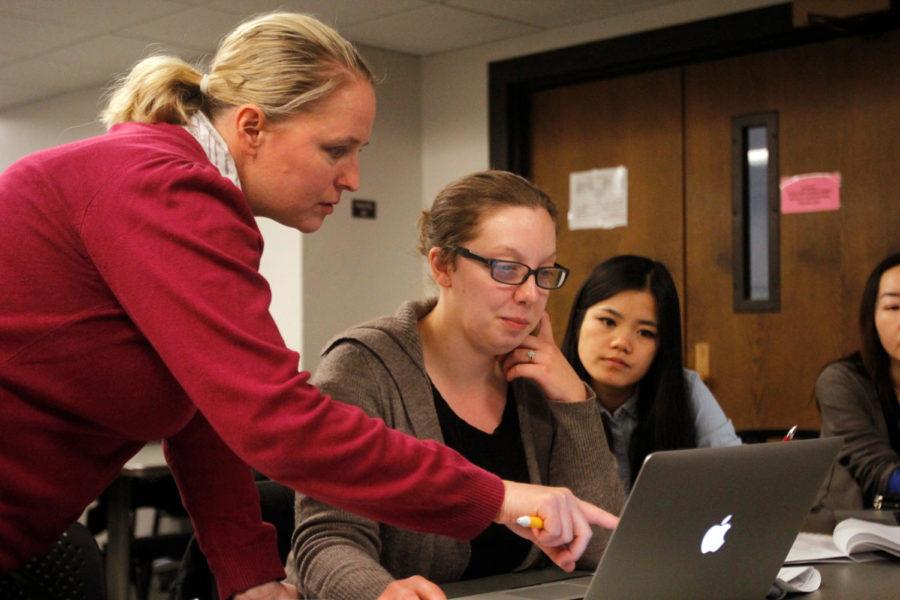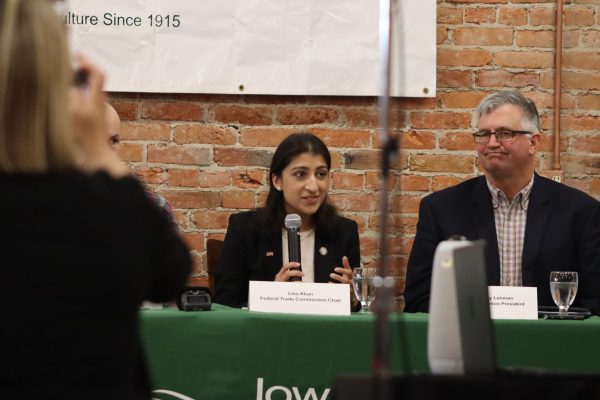Students aid rural retailers: Small town Iowa businesses give students perspective
Kyle Schlichting/Iowa State Daily
Jessica Hurst, left, assistant professor of apparel, events and hospitality management, talks to Jennifer Gordon, middle, and Shuangshuang Li about their work for the Iowa Retail Initiative. Gordon and Li are majors in apparel, events and hospitality management, and they are working with the Slater community to help brand various retail projects.
April 29, 2014
Students in the College of Human Sciences are gaining a new perspective on small town Iowa by partnering with the Iowa Retail Initiative to strengthen rural communities and retailers with new ideas and competitive strategies.
“Everybody wants the quality of life that we have in Iowa small towns,” said Susan Erickson, Iowa Retail Initiative program co-director. “But you can’t have that without purposeful support of local retailers.”
The Initiative is a collaboration between the College of Design and the College of Human Sciences supported by the ISU vice president for extension and outreach. It aims to connect Iowa retailers with helpful resources from a variety of areas of expertise.
Erickson said that the initiative is a way for the university to be valuable in ways beyond the classroom as part of its land grant mission.
Linda Niehm and Jessica Hurst are initiative board members and ISU associate professors in apparel, events and hospitality management.
Niehm teaches Apparel, Events and Hospitality Management 474 and 574, Entrepreneurship in Human Sciences. This course allows students to do hands-on retail business market analysis for five businesses in Collins, Iowa, Gilbert, Iowa, Colo, Iowa and Huxley, Iowa.
She said that the initiative is a unique, holistic approach that offers the whole package to retailers.
Hurst teaches AMD 576. This course has two groups of students doing community visioning in Collins and Slater to make the communities more vibrant.
Students have met with community leaders, politicians and concerned citizens, said Drew Kamp, director of the Story County Community Outreach for the Ames Chamber of Commerce. Both courses are working with Kamp to connect with the towns.
“Students have been able to see that these businesses are people’s lives,” Niehm said.
Groups from both courses will present their plans of action at the College of Human Science’s Entrepreneurship Showcase on May 1 from 6-8:30 p.m. in the Le Baron lobby.
Kamp said that Students benefit from understanding what it takes to make it in the current rural market. He also said that local businesses are the backbone of employment in small communities and this project is a low-cost option for them.
Through the introductory and checkpoint visits, Kamp said that the communities have been impressed with the professionalism, ingenuity and freshness of ideas coming from students.
Catherine Clark and Maren Sundby, seniors in apparel, merchandising and design, are students in the Slater group in Hurst’s ADM 576 course.
Sundby said that community members like the idea of being a small town and do not want chain stores. She said that this experience has given her more respect for small business owners.
“They’re proud of their small town home,” Clark said.
Ronald Prescott, initiative co-director and program coordinator in economics, said that he hopes to see the initiative become an ongoing network of connectedness and collaboration of retailers. He works toward this by building relationships in Iowa communities and identifying people at Iowa State who could be resources.
He uses Google+ and Skype to communicate with his connections across the state and has posted a series of how-to videos on the initiative’s site. Topics include instruction for retailers on how to set up Google Places, Yahoo Business, Bing Portal and Facebook ads.
“I’m more of a techy kind of old person,” Prescott said.
Some members of the initiative board have personal connections with rural America. Hurst said that it was disheartening to see the vibrant main street diminish in her home town of Everly, Iowa.
“When we take shortcuts and go for the cheapest thing, we end up paying some high long-term costs,” Erickson said.
With her graduate degree Hurst has researched rural retail in an effort to help small communities.
She has also researched the “brain drain” phenomenon — young adults who leave a small community for college and do not return. She said that this project might plant a seed of small town living in the minds of students.
Prescott said that small town retailers offer the service and familiarity that big-box stores do not, and part of the experience is talking with owners.
He said that there are people at these stores with stories to tell and he enjoys hearing the stories behind the businesses.
“My frustration in Iowa is that we don’t pay enough attention to our characters,” Prescott said. “I think we miss that in this generation. We don’t story tell.”
He said that he encourages students to explore the rural areas surrounding Ames.
“I love these Iowa communities,” Prescott said. “I absolutely love them.”

















